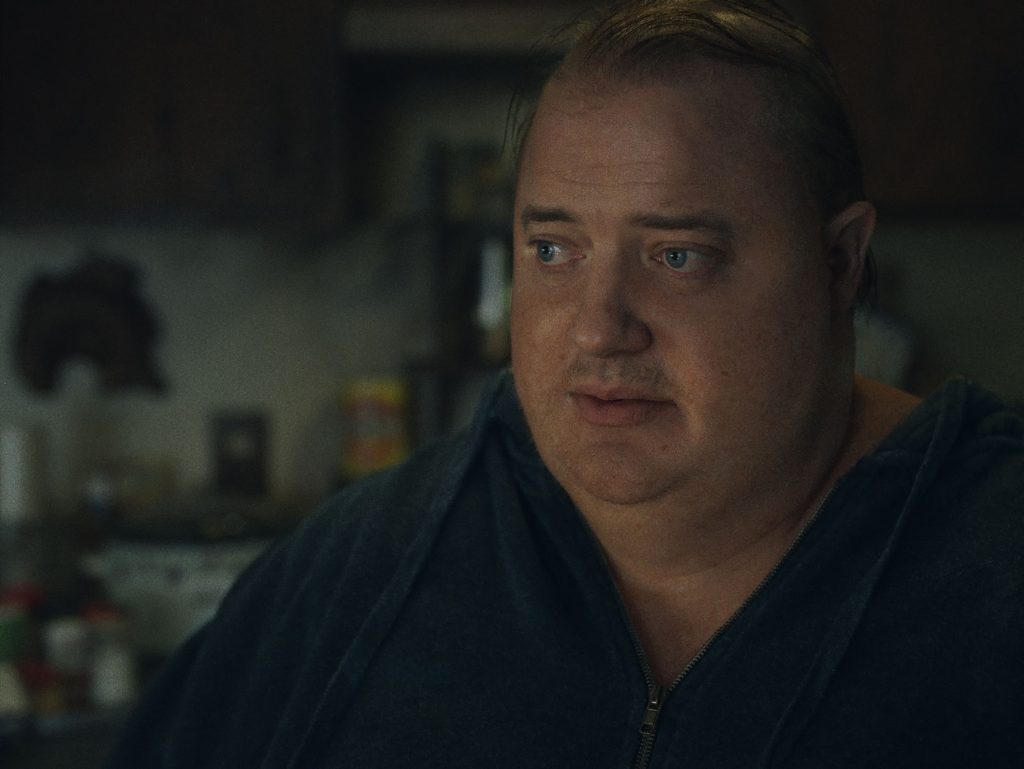Review: “The Whale” is a Real Son of a Beach

Darren Aranofsky’s The Whale has really been making a splash. Opening at the Venice International Film Festival to a 6-minute standing ovation, The Whale was touted as an official comeback vehicle for Brendan Fraser and has placed him firmly on the road to his first Oscar. Despite the accolades and some arguably solid performances, though The Whale has captured the interest of the public, I can’t say that it’s earned. I hated this movie, but not for the reasons you may think.
Brendan Fraser plays Charlie, a grieving man who teaches his online essay writing course with the camera off. He’s dying (sigh, of being fat) and he wants to use the short time he has left to reconnect with his estranged daughter, Ellie (Sadie Sink), despite years of interference by his ex-wife Mary (Samantha Morton). When we open the film, Charlie is in the middle of a medical emergency and he’s visited by a door-to-door missionary named Thomas (Ty Simpkins). Thomas and Charlie forge an uneasy friendship until their bonding is interrupted by Charlie’s best friend/nurse, Liz (Hong Chau).
Charlie’s partner, Alan (Liz’s adopted brother), suffered from depression and anorexia and took his own life. Charlie explains that he’s always been a big man, but losing Alan caused him to spiral out of control until he eventually came to weigh 600 pounds. Liz informs us that Charlie’s health is deteriorating and if he doesn’t go to the hospital, he will die within the week. He refuses and Liz worries it’s about money so she scores him as much medical equipment as she can to help.

The film received a healthy amount of flack for casting an actor who wasn’t obese to play the role, but I have to say, the obesity and fatphobia are surprisingly in check in the film. It’s the treatment of mental health that’s allowed to run rampant. Charlie’s limitations are physical, but they’re also psychological. We understand that he’s not depressed because he’s fat, he’s fat because he’s depressed, but Charlie’s refusal to get treatment is the continuation of this depression in action and it doesn’t really seem to be resolved. The author of the play and the adapted script, Sam Hunter, wrote the play during a time in his life after a loss where he gained a significant amount of weight. It wasn’t as much as Charlie, but the weight served to place boundaries and limitations on what Hunter could do.
It could be predatory, but I do think that’s the point. We spend the bulk (outside of a few flashback scenes) of the film inside Charlie’s second floor apartment. The claustrophobia becomes more pronounced when it feels like he takes up more space than normal. Aronofsky shot the film in 4:3 to box the viewer in even more. It’s a type of manipulation to make sure the viewer focuses on Charlie’s weight despite the other very real problems he has. When he gets mocked, it’s for being fat, but often as a last resort. This shows that his weight is both the entire point and also beside it.
Charlie has a beautiful monologue where he explains he and Alan would lie around naked and touch each other. Charlie being the bigger man and Alan being the slight waif, they fit together and they were happy. All of that is upended by Alan’s death and Charlie’s subsequent depression, but also Aronofsky’s need to portray mental illness as a sort of sadistic quirk.
Darren Aronofsky is famous for taking the dredges of society, the underdogs, the angry rebels, the sad sacks, and making them feel triumphant even with a shallow bar and lowered expectations. Black Swan showed us white trash ballet, The Wrestler was a beautifully broken portrait of a beautifully broken man. Even Noah (despite the casting messiness) sought to humanize and show a different side of the flawed legend. In The Whale, we spend over two hours watching a depressed man slowly kill himself and drag his friends and family down with him.

Bleak doesn’t begin to describe it. Everyone in Charlie’s life is peak manic and he tries to maintain this air of… not exactly nonchalance, because he cares very deeply, but instead a sort of willful ignorance to the way he’s hurting the people he claims to love. And Fraser does an excellent job. He’s got eyes that do 45% of the acting for him and he uses them wisely. But the script and the characters he surrounds himself with are all stuck in various stages of trauma with no hope of escape. This is where the true horror lies.
I love Sadie Sink, but so far I’m missing variety in her performances and while I know she put a lot into preparing this role, I don’t know if she ever really nailed Ellie’s true pain. She was angry and petulant and then slid right into being full on psychopath. Her performance was startlingly one note and made me want to scream every time Charlie would tell her she’s perfect or amazing. We see she’s kind of an emotional doppelgänger to Mary (and, gosh, I love Samantha Morton but wow). Throughout the film it’s easy to question why he would want her in his life and vice versa, and as the real reasons become revealed it shows Charlie to be a manipulative and selfish man who peddles in toxic positivity.
I will praise two performances in particular. Both are unhinged, but in really pleasing ways. First was Chau’s Liz. She fills her role with so much love and passion, but also bite and anger and annoyance at this man she loves. To the film’s detriment we never got any flashback scenes with Alan. Only a soft focus Polaroid to embody the pain of the loss of this great love. Where we see a glimpse of how epic that love was, is through Chau’s performance. Liz’s journey and self-discoveries were heartbreaking and so compelling.
The second performance is Simpkin’s Thomas. The corruptible man of God is no new trope, but the sincerity Simpkins pours into his role is pretty astounding. His character is like a thread you pull and pull until it becomes completely unraveled and watching him be emotionally tortured by Ellie was both frustrating and thrilling.

They were a couple of bright spots to a film where every twist was more preposterous than the last, and the ending literally made me roll my eyes. I am interested to read the original play to see exactly what nuance was missed in the transfer. I want a comeback for Fraser more than anyone, but I think he deserves better than this film.
Score: 2.5/5
Author: StickyKeys
Help support independent journalism. Subscribe to our Patreon.
Copyright © The Geekiary
Do not copy our content in whole to other websites. If you are reading this anywhere besides TheGeekiary.com, it has been stolen.Read our

*dregs of society
I’ll be honest and say it really doesn’t sound like you understood the film very well at all. It seems like you wanted the film to play out differently to fit a narrative that you’ve constructed for yourself about how someone should depict obesity and mental health, and immediately decided to hate this film because they chose to depict it differently.
Thanks for your comments!
Santa is kind.
Dr Phil says, “Are youuuu craaazzzzeeeee?!?!” (in a white trash southern drawl…)